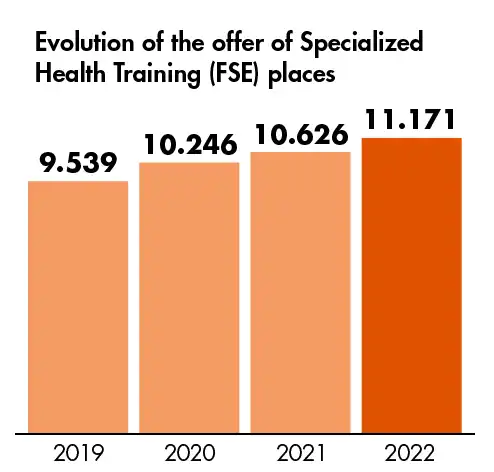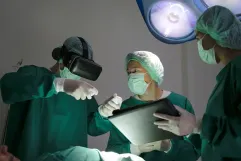
Private healthcare as an alternative to the public system collapse
A reduction in public funding combined with an increase in demand due to the aging of the population and the high prices of pharmacy expenses are determining factors.
Between 2018 and 2021, private health care professionals increased by 7%. If this situation is not reversed, the proportion of professionals and patients who opt for private health care is going to grow over the next few years. This case is particularly obvious with regard to mental health, where private psychology consultations have increased exponentially when people are faced with the impossibility of gaining access to public psychologists within a reasonable time period.
El sector salud, uno de los más demandados
Beyond the statistic data collected by the INE, there is no register of doctors in Spain, something that professional associations of health care workers have been demanding in recent years. In this context, another source that provides information on the trends within the sector is the offer of places for Specialised Health Care Training (FSE), which gives access to residencies in several health science specialities (biology, biochemistry, nursing, pharmacy, physics, medicine, psychology and chemistry).
During the 2022-2023 academic year, a total of 11,171 FSE places were offered, amongst which there were 8,550 places in medicine; 1,961 in nursing and 308 in pharmacy, amongst other specialities. In overall figures, the number of places increased by 5% compared to the previous year and is 39% more than five years before.

With regard to university studies, health is the branch most requested by students. According to the CYD 2021/2022 report, during the academic year of 2021-2022, there were five applicants for every place in this field, reaching 12.7 applications per place in medicine. If we look at the profile of the university students in health care disciplines, their high level of knowledge stands out (in general, they must pass high cut-off marks to get a place) and their good preparation in specific competences. The demands of the sector (both due to density of knowledge and to the dedication in hours it requires) mean that not all families can take on the costs of this extended training.
Accordingly, the scholarship programme by Assistència Sanitaria, aimed at third cycle students in Catalan universities and that covers up to 50% of the registration fees, is trying to democratise access to the profession. It is one of the few study aid programmes in the health field, consolidated and funded completely by a private institution in Spain as a whole. Since its creation in 2008, 3,758 applications have been received, with 434 grants being given out and awarding almost 410,000 euros.
Education and technology as key aspects
According to the report The inevitable change: anticipating a new scenario for the medical profession prepared by the consulting firm Luzán Cinco, the university plays an essential role in the development of the medicine of the future, as it must operate a change in the study plans to strengthen and broaden subjects related to statistics, computation, humanism or bioethics. Basic knowledge in areas such as genetics, proteomics, biomics or computing will all be essential. Therefore, health care professionals will have to train in these new competences, which must necessarily be incorporated to the teaching programmes.
Interaction skills with other professionals will also be a key element: team work, communication and leadership skills, as contact with other types of professionals will be much more common: physicists, engineers, biologists, computer scientists… They will all have to acquire languages and skills to understand each other.
Without any doubt, technology, which has been conquering spaces in all areas of society, will be a leading player in future health care. The application of technological advances will allow the doctors of the future to improve their management of the information and be more practical. To do this, adaptation skills will be essential to master the possibilities of artificial intelligence, portable devices, precision medicine and virtual care.
Along these lines, the neurologist, businessman and speaker, Ignacio Hernández Medrano, considers that: “Medical information is accumulating fast; we are generating more and more medical information and we have created something that we could call knowledge inflation. We generate more than we can absorb.” Medrano is one of the founders of Savana, a company that uses technology, artificial intelligence and big data to take advantage of the information from patient clinical notes and put it at the disposal of doctors and researchers. “The digital health that seems so innovative today is going to cause enormous democratisation; we are going to raise health standards a great deal more than the experts can anticipate.”
However, according to the neurologist not everything is going to be positive: “All of this is going to have a cost: stress. We are going to pay very close attention to our health, our illnesses, our vital signs, just as today we are hooked to our mobile phones. I think that the era of hypochondriacs is on the way.”
Where are we headed?
Without any doubt, the trend is showing a move towards a faster, inexhaustible and stressed society, a breeding ground that favours stress, anxiety and burnout in which both doctors and patients must learn to protect and look after their physical and above all, mental health. Medrano explains that “what is going to change now is that, to a certain extent, we can apply very powerful algorithms to anticipate the occurrence of an illness. Using this predictive model, when something changes in your organism, although you may not have noticed it, it will be recorded and the professionals can act accordingly.”
The other concept that Medrano underscores is personalisation: “Each person has a genome, a set of genes and a microbiome, a set of bacteria that live inside us. All of this determines our response to the environment or even to drugs. In the future, we will be able to apply precise medicine, individualised to each patient’s requirements. We are no longer going to prescribe paracetamol to everyone who has a headache, but rather a much more personalised medication. And this is not a dream, it is already happening in some disciplines and the rest will follow over the next few years.”



